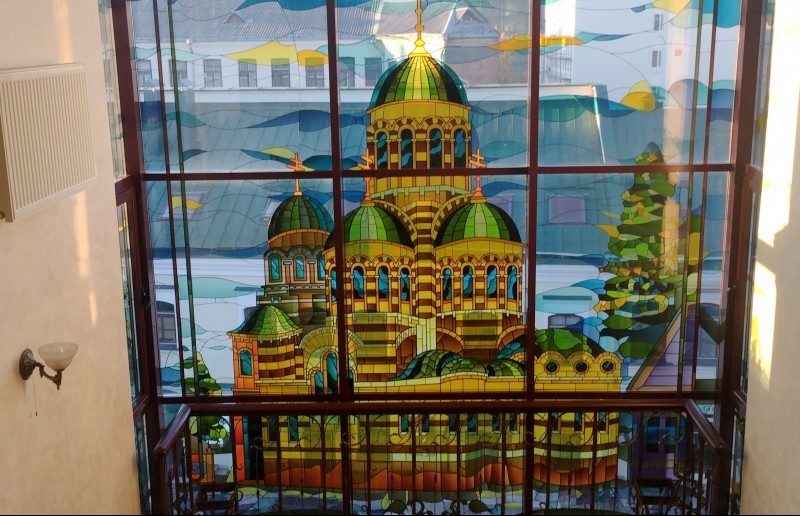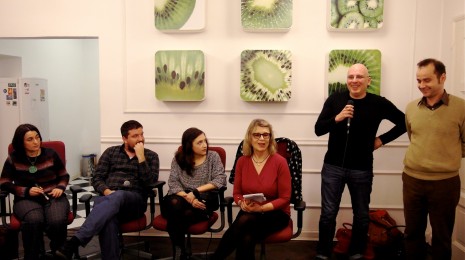
What is the difference between journalism and literature? Between art and crafts? Which role does journalism play in society and can it contribute to the understanding of things unknown to us? Has any of this changed since the introduction of the Internet?
These were some of the many questions discussed during the Global Bar held on the 30th of October at the Garni Hotel in Minsk, Belarus, the hometown of Svetlana Alexievich. Considering the theme – “Writing in the footsteps of Svetlana Alexievich and Ryszard Kapuściński” – the bar was perfectly timed, held just a few weeks after Svetlana Alexievich had been announced as the winner of the Nobel prize in literature. Both writers originate from the area of cultural interweaving between Belarus, Ukraine, Poland and they are both marked – in different ways – by their Soviet experience.
The panellists included David Isaksson, Sophie Heine and Predrag Dragosavac from Global Reporting. They all got a great amount of input from members of the audience, made up by journalists, writers and people interested in culture. This Global Bar was held in English, Russian and Belarusian and was translated by Veronika Vasilevich.
David Isaksson started the discussion by describing the impact Ryszard Kapuściński had on him as he started his career as a journalist.
“Something that made Kapuściński special was that he told the big stories through ordinary people. He didn’t try to get to the president like other journalists, he tried to find the person who made the food for the president. When you write this way you balance the line between literature and journalism. “
The work of both Svetlana Alexievich and Ryszard Kapuściński is hard to place into one single genre. Is their writing journalism or literature? And what is the difference between the two? One person from the audience meant that journalism is defined by its factual content, and should not tell us about emotions. Then it can come dangerously close to being propaganda. A journalist from the audience added:
“I associate literature with fiction, or that it should have some kind of imaginative content. Journalism is also temporary; it’s only up to date until the next copy is out. But literature is considered to be and should be eternal.”
Predrag Dragosavac turned the discussion by saying that it might not matter if you write journalism or literature. The work of Svetlana Alexievich and Ryszard Kapuściński is equally valuable however you define it:
“For me it’s more about what is art and what is craft. When somebody takes something that is commonly considered to be crafts and then works with it with soul and dedication day after day. At a certain point it turns into art. For me this is what these writers have done, they have done a lot of writing and in the end, in terms of form, content and style, it turns into art. It doesn’t really matter what it is because it has turned into art.”
Sophie Heine moved to the Soviet Union in 1991 and when she moved back to Sweden in 1994, it was from another country: Russia. She told us that she could recognize the reality depicted in the work of Svetlana Alexievich. Sophie Heine emphasized that the many testimonies create a direct meeting between the sources and the reader. She attributes this effect to Alexievich’s method of adding one quote after the other.
“Could this be a fruitful way to tell a story, also for journalists?” Sophie Heine asked.
Many of the participants pointed towards the importance of journalism creating understanding – for “the other”, for themselves and for the world. Predrag Dragosavac expressed disappointment towards the journalists who in their reporting reproduce stereotypes and prejudices.
“Very often journalists don’t look beyond the stereotypes because it’s the easier way. For me, every writer who succeeds to avoid the dominant narrative and to see and show us nuances, real human beings, has achieved a lot.”
David Isaksson added:
“As a Swede that has never lived in the Soviet Union, I want to be able to understand and feel what that was like. And it’s the small details that make it possible. That is the key to understanding events, processes and people, both in a historical sense and right now.”
He continued:
“Right now we are reading a lot about the horrible actions of the terror group ISIS, but we have no idea why they are doing what they do. I think that there is a great need for that, to understand the incomprehensible. Journalism and literature has an important role to play here.”
Another topic that was addressed during this Global Bar was the imminent death of printed media. What will happen to the traditional form of journalistic writing? And do young people even read books? Is there a place for the work of Alexievich and Kapuściński, and the form of writing that they represent, in an era that becomes more and more digitalized?
But few seemed worried:
“It has been a long time since people started using the Internet and started playing videogames, but we still read. Young people have just changed the form of reading. They have always wanted to do things their way and the older generations have always reacted as if that was a bad thing”, said another journalist from the audience.
David Isaksson believes that it is exactly the kind of writing that Alexievich and Kapuściński represent that actually will survive. One of the main problems of printed news is that when you have the physical newspaper in your hand you have already read the big news in an app or on the Internet.
“With other forms of journalism, like longer, descriptive stories for example, it doesn’t matter if you read them today or tomorrow or whenever. That’s why that kind of journalism can survive. You can read it in 10 years time like Kapuściński or in 20 years time, as is the case with Alexievich’s story on Chernobyl.”
Before the discussion continued in smaller groups, David Isaksson concluded the Minsk edition of Global Bar with a quote from the sci-fi writer Douglas Adams:
”Generally, old media don’t die. They just have to grow old gracefully.”
This edition of Global Bar was covered in local media by Belsat and Mediakritika.




